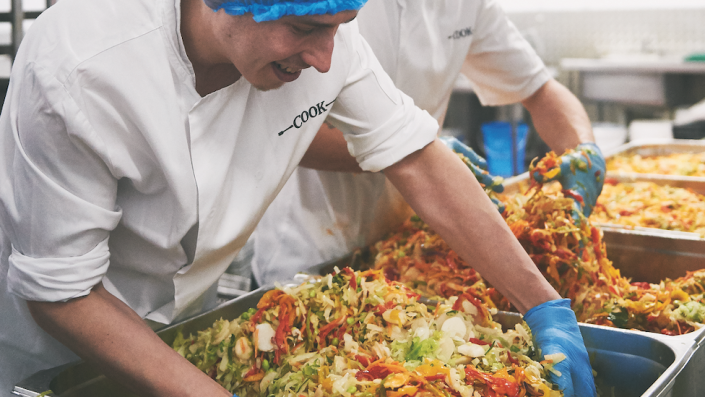
Grocery store customers may quickly be checking the environmental affect of meals earlier than placing it of their trolleys, thanks for brand new analysis.
Dependable data of this sort hasn’t been accessible.
That is as a result of UK producers solely need to checklist their predominant substances, and that is by proportion, not quantity.
Scientists have overcome the issue through the use of public databases to estimate the composition of 1000’s of meals merchandise and their affect.
Many shoppers wish to understand how their weekly meals store impacts the planet, though rising costs will doubtless be a extra rapid concern for many.
Prof Peter Scarborough from Oxford College informed BBC Information he hopes that the analysis results in an eco-labelling system for purchasers, however he believes that the larger affect would come if the meals trade makes use of it to chop its environmental footprint.
He stated the meals trade has additionally been “crying out” for the brand new software and that the algorithm is already being utilized by some producers and caterers to make their meals extra sustainable.
“It fills an enormous hole. Producers, caterers and retailers have targets for reaching internet zero [emissions] they usually haven’t got the instruments they should get there.”
“Now they’ve this knowledge, and a few of them are speaking to us about issues they’ll do to assist folks transfer in direction of extra sustainable meals buying. The information may assist producers regulate their formulations.”
The evaluation has limits. Ingredient lists do not have a tendency to point out sourcing data comparable to nation of origin or agricultural manufacturing methodology. However Dr Mike Clark, who led the analysis at Oxford College, referred to as the software “a major step in direction of offering data that would allow knowledgeable decision-making”.
The Oxford workforce estimated the composition of 57,000 meals and drinks in supermarkets within the UK and Eire. It then assessed the affect of rising strategies, processing and transport, in opposition to key environmental measures together with greenhouse gasoline emissions and impacts on nature.
The workforce developed an algorithm to calculate an eco-score for the environmental affect of particular person foods and drinks merchandise.
Catering agency Compass Group started working with the researchers in January.
Its Culinary Director for Enterprise and Trade Ryan Holmes, informed BBC Information that use of the algorithm “made us take into consideration how we strategy sustainability throughout the office” as the corporate sought to realize internet zero emissions by 2030.
He stated the corporate took out some meat, elevated proteins from different sources comparable to lentils and used extra complete grains and greens and obtained a greater rating for a lot of of its meal choices for employees canteens.
Meat and dairy rating excessive
Beneath the algorithm, the upper the rating, the upper the environmental affect. As anticipated, meals containing extra meat and dairy rating a lot increased than these with extra plant-based substances. In contrast, many meat alternate options comparable to plant-based sausages or burgers, had between a fifth and fewer than a tenth of the environmental affect of meat-based equivalents.
However there was additionally vast variation inside particular classes.
For instance, the highest-impact pork sausage scored a couple of third increased than the least impactful. And the affect of biscuits rose the extra chocolate they contained, exhibiting that small recipe modifications may make massive variations, in keeping with Prof Scarborough.
“If you happen to take a look at the federal government technique on reaching internet zero [emissions by 2050] round meals programs, they don’t seem to be measuring the precise greenhouse gasoline emissions, as a substitute the advice is to cut back meat consumption.
“That is OK, as a result of meat has the most important greenhouse gasoline emissions, however you miss an enormous quantity in multi-ingredient meals which had beforehand had no discount targets based mostly on them by any means.”

COOK, a Kent-based frozen meals producer seeking to diversify away from meat, has additionally labored with the researchers. It desires to discover whether or not measures like placing eco-labels on its merchandise would assist clients embrace a extra sustainable weight-reduction plan.
“The software may assist us by guaranteeing that as we’re growing new recipes there’s a scrumptious possibility for somebody who’s actively seeking to scale back their environmental affect by means of what they eat,” stated Andy Stephens, COOK’s head of sustainable meals.
The researchers do not foresee eco-labelling turning into obligatory within the close to future. They need corporations to undertake it voluntarily, one thing they consider would make them compete over the sustainability of their foods and drinks merchandise.
A spokesperson for the Division for Surroundings, Meals and Rural Affairs welcomed the initiative.
“We wish to give everybody the data to make more healthy, greener or extra sustainable selections with the meals they purchase, in the event that they wish to. Voluntary trade schemes are actually optimistic and thru our Meals Technique we’re additionally how we are able to higher assist them in future.”
The analysis has been revealed within the Proceedings of the Nationwide Academy of Sciences.
